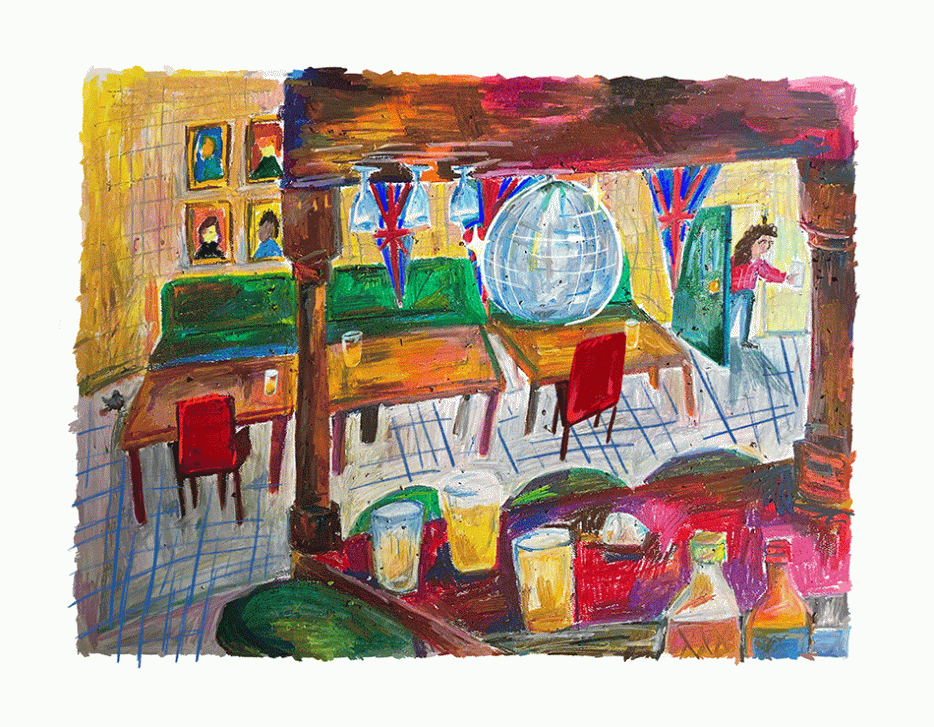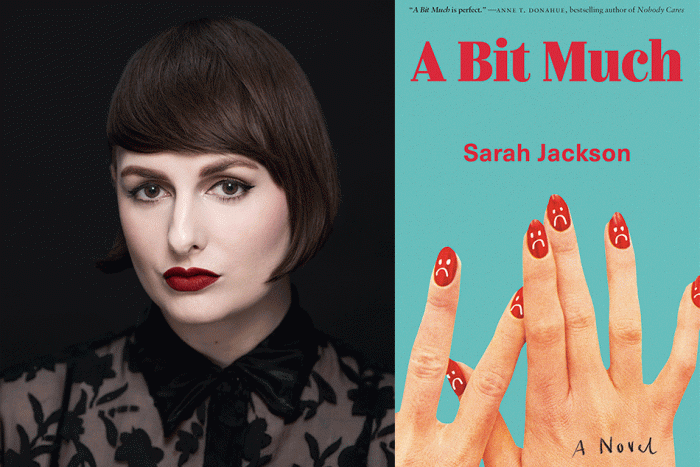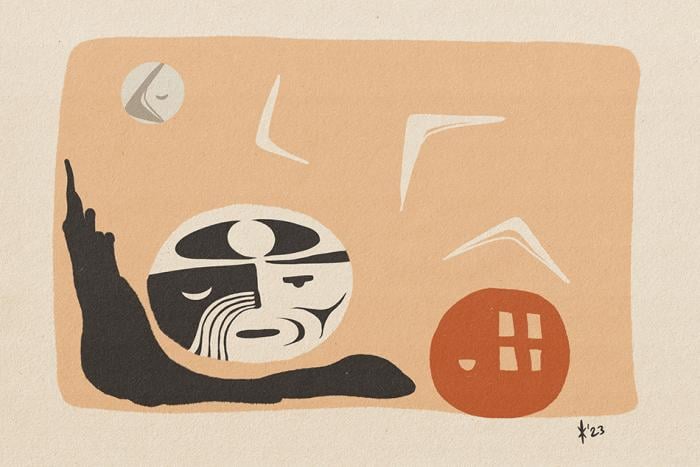Like underage drinking and unrequited love, the underpaid part-time job is a cornerstone of teenage life. I had a string of them but none shaped me more than the year I spent as a barmaid in our town's “premier fun pub.” The landlord’s loud claim signaled an obvious association to the league of men and boys who flooded through its doors come the weekend. Screens hung from every corner of the room so nobody missed a shot while queuing three-deep for pints of snakebite or shandy depending whether the drinker was on one or recovering from the night before. To work the bar in these moments was its own game of skill: scan the front row of faces, memorize an order, tune out the jeers from the back. The trick was to bump regulars up the queue to keep them sweet and leave the shitheads ’til last to teach them a lesson.
Aside from the footie, what qualified the pub as fun was a combination of free karaoke on Wednesdays, last year’s club hits played at eardrum-piercing levels on Fridays, and an ah-fuck-it attitude from everyone in charge. The staff smoked at the bar on breaks, commandeered the karaoke—I always roped someone into joining me for a faithful rendition of Aqua’s “Barbie Girl” to let off steam—and, by and large, gave as much lip as they got. That’s the way the patrons liked it. A captive audience’s no fun if you’re not getting anything in return. Most of the bullshit I let slide with raised eyebrows and rolled eyes, enough to titillate without getting into it. The only time I really bit was when an oily prick, barely out of his teens, smugly asked me if the rug matched the curtains. He got a full pint in his face in reply. My only regret is not prefacing it with a little pub wisdom: “Beer’s good for your skin.”
The inside of the pub was as predictable as its clientele. Gloss-painted wood—the floor, the tables, the bar itself—made for easy clean-ups, heavily patterned curtains and upholstering disguised stains, disco lights maintained an illusion of excitement, fruit machines gobbled up loose change. There were no toilet seats in either loo; an empty gesture to discourage cocaine use given the fact the local drug lord was among our most loyal customers. He dated one of the other barmaids and chain-smoked his way through many an afternoon slumped over his usual table in the pub, his shoulders heavy with the weight of keeping the rowdier members of our tiny town keyed up at the weekend. He and his colleagues always seemed harmless until one of them showed up at the door with bulging eyes and an axe in his hand. The landlord held him off with a barstool and managed to lock us all inside before administering shots of whiskey to calm our nerves. I’d not long turned eighteen and my life finally felt like a movie.
It was summer 1997, a time marked by mass delusion: Tony Blair’s New Labour was going to right all the Tories’ wrongs to a soundtrack of D:Ream’s “Things Can Only Get Better,” and The Body Shop was going to save the planet by selling dewberry-scented moisturizer. For my part, I told myself I became a barmaid to save up in my year out before going to university, but really I was just desperate to feel like somebody—that girl from the pub would do. My day job at Argos kept me out back in the catalog store’s warehouse, scaling stepladders to pick boxes containing hair straighteners and Tickle Me Elmo toys off the shelves as the ticket printer spat out endless customer requests. Behind the bar, I at least had a little power. Like a background character in a long-running soap, I could be seen but not known.
To serve drinks in an English pub is to be a very minor public figure on an extremely local scale. In small agricultural towns like mine, there was always a high turnover of minimum wage eighteen- or nineteen-year-old bar staff because people either moved away for college or left when they got pregnant or quit for a supermarket job with better hours. The landlords never cared because it meant there was always an influx of new blood to entertain the customers. As a gatekeeper of the hallowed state of insobriety, you are a face without a name whose attention must be attained by any means possible. The lager lads tossed cheeky comments over the counter in a bid to win a smile. The stout drinkers were always angling for a therapy session. The shot takers wanted an accomplice: “And pour one for yourself,” they said, which is the closest anyone ever gets to a tip for a drink in the UK. Only the whiskey and water men, invariably over sixty and dressed in tweed, sat in silence, their presence a demand in itself.
Whoever was asking, the wall of gleaming spirits behind me and row of draft beer taps at my fingertips made me feel composed and in control. Pouring a perfect pint with just the right amount of head—no more or less than a knuckle of froth—was a satisfying task. Changing barrels in the basement, rolling the empty out the way and attaching a new one to the umbilical cord that piped it upstairs, made me feel strong and capable. Restocking the glass-fronted refrigerators with bottles of garishly-coloured alcopops, carefully positioned so the labels all lined up, grew into an obsession.
I knew a bit about the joy of just-so from my first part-time job as a chambermaid, aged fifteen. The crack-of-dawn bus ride out to the health spa’s countryside location wasn’t fun, but I felt a small thrill every time I turned a disheveled hotel room into a freshly made space. This only held true for vacancies, however; running into guests was a turn-off. Like when one woman’s posh husband demanded blueberry breakfast muffins with a swift pat of my head. I started drinking to get drunk around the same time. Money was for buying obliteration. It didn’t take much and the result was guaranteed: a few dry ciders for a fistful of pound coins; blurry confidence gave way to sharp anger every time. When I invariably fell over in the street, I screamed at anyone who tried to help me up. The pain was mine and I didn’t want to share.
When I naturally graduated from scamming drinks to serving them, I was still an insecure teenager. But working in the pub provided an opportunity to escape my reality in a different way. I knew what was required of me and played along. The etymology of “barmaid,” an antiquated title befitting the chauvinistic treatment that comes with the territory, joins together two words that infer an expected display of behaviour. “Bar” is a colloquial word for a tavern or public house that came into usage in the late sixteenth century because drinks were traditionally served over wooden counters with carved wooden bars that extended to the ceiling. This architectural styling serves to literally frame the worker behind the counter as if they are on a stage. “Maid” is shorthand for “maiden,” which initially referred to an unmarried young woman with an underlying virginal association, but over time came to mean a servant in a domestic setting. A gendered title for gendered expectations. The role of the barmaid, therefore, is not only one of service but of performance. In a quaint little book titled Toilers in London: Inquiries Concerning Female Labour in the Metropolis, published in 1889, the author makes that much clear: “Barmaids are obliged to put up with a great deal, for if they call in a policeman they are generally bound to charge someone, and this brings disgrace on the business. So they wink at many things, and try to keep their customers in good humour, merely making a few slight objections when a man jumps across the bar to give them a kiss, or wishes to act as an amateur hairdresser.”
Performance is more commonly understood as a form of expression but it can also be a mode of evasion. A way to not be you until you can really be you. Maybe that’s why so many of us end up in the pub. Alcohol is the salve and stultification of the small English town. The one or two drinks that take the edge off existential frustration easily slide into the four or five that have you picking fights with friends. It had been this way for hundreds of years. Located in the middle of the Midlands, our terminally mid town had once been a pit stop for travelers heading up north from London. The echoes of that time remained in the many pubs and travel agents that lined the market place. There was nothing to do but get out your head or plan a getaway. It didn’t matter if you made a fool of yourself in one pub because there was always another one just around the corner. When everyone shares the same avoidance tactic, things get static fast.
That’s why the power dynamics, crass banter, and occasional rampaging axe maniac held appeal. Pub drama provided a perfect distraction from my pedestrian teenage angst. But the unfortunate thing about regularly spending time in the company of dickheads is that it fucks with your instincts. Anyone who demonstrates the bare minimum of kindness seems desirable by default. That’s how I ended up with my first boyfriend that same summer. One of the lager lads who played in a local amateur football team, he was ten years older, drove a fancy car, and still lived at home with his parents. Whatever he did for a living I have long forgotten. What I do recall is that he was soon spilling details of our sex life to his teammates, who didn’t hesitate to let me know as they jostled to get served.
Before I knew it, I’d slotted myself into a stereotype: the teenage girl dating an older guy who uses her for clout with his friends while criticizing her behind closed doors. As predictable as the pub’s decor. Even his mother committed to the bit in despising me to displace the disappointment she felt in her adult son for dating someone inappropriate. I got my own back by kissing a boy my age out the back of the pub on my lunch break. Then I promptly undid my good work by coming clean and begging for forgiveness. It turned out I wasn’t cut out for acting after all.
In an effort to go off-script, I used some of my saved-up wages to travel to Warsaw because of a children’s novel I’d read years before. It was about a girl named Ruth who led her siblings on a treacherous journey from Poland to Switzerland when the horrors of the Second World War separated them from their parents. I wanted to be like my fictional namesake: strong, independent, resourceful. The plan was to backpack around Europe with a school friend but we ran out of money in Prague. The cheapest ticket home was a bus to London that took twenty-four hours. One passenger decided he wanted to sleep in the gangway and wordlessly got his way by pulling out an oversized army knife to carve up an apple before passing out. At the German border, a Russian guy was kicked off the bus for unclear reasons. A few hours later, two Czech girls were left stranded in France. They had paperwork detailing their au pair jobs in London but the bus driver refused to wait when British passport control held them for questioning. Nobody seemed to care that the bus ticket cost the equivalent of a month’s wages in Prague. What were they to do now? They were just teenagers trying to get to a future which existed someplace far away.






